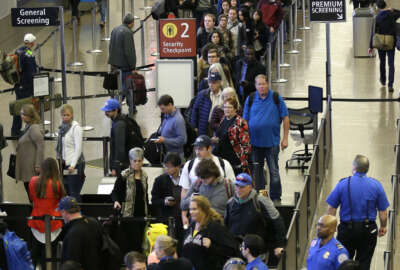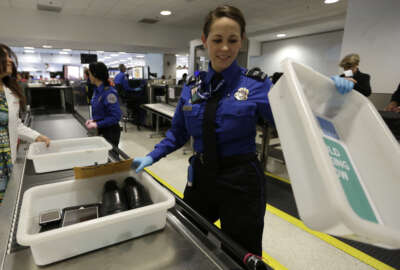
House investigation reaches top of the TSA food chain
The House Oversight and Government Reform Committee continued their investigation of the Transportation Security Administration, this time hearing from Administ...
House lawmakers have taken their investigations into abuses of power at the Transportation Security Administration straight to the top.
Peter Neffenger, administrator of TSA, tried to defend the changes he’s made in the agency to address the abuses of power, particularly involuntary reassignment, since he took over TSA 10 months ago. But ome members of the House Oversight and Government Reform Committee were unwilling to be placated.
“You cannot recruit, you cannot retain, you cannot train, you cannot administrate. It’s a huge failure,” John Mica (R –Fla.) said, during the May 12 hearing.
Neffenger said that since he has been in charge, TSA has conducted no involuntary reassignments. In addition, the process itself has been changed to include more oversight. Requests for involuntary reassignments now undergo four distinct steps before being approved.
“I don’t think the manner in which we were doing directed reassignments before I got here was proper. … We put significant controls on that process now,” he said.
First, TSA’s office of human capital has to approve the request. Then it goes to the individual potentially being reassigned, to see whether they desire the change. Then the chief financial officer has to sign off on the costs. Finally, the request appears before the executive council and Neffenger himself for approval.
Three TSA whistleblowers testified before the committee on April 27, saying that involuntary reassignment was one of the major tools certain executives would use as retaliation against employees who reported wrongdoing. The whistleblowers said it wasn’t an issue of institutional corruption, but the actions of a handful of executives.
Neffenger said he wasn’t aware of the identities of the executives the whistleblowers spoke of, but he doesn’t think they’re a problem anymore.
“The people who were doing most of those reassignments left the agency before I started,” he said.
No one, according to Neffenger, has been disciplined or placed on administrative leave. The Office of Special Counsel is still conducting investigations into the cases of two of the whistleblowers, and Neffenger is waiting to hear the outcomes of those investigations first.
Since he took over TSA, Neffenger said the agency’s executives have performed their jobs without issue. He spoke of issuing very clear requirements, and holding his personnel accountable. However, Rep. Elijah Cummings (D-Md.) pointed out the suspicions voiced by one of the whistleblowers, namely that the offending executives were simply lying low, waiting for Neffenger to be replaced during the administration change. Mica agreed, saying Neffenger could be being fed misinformation.
“Sometimes the leader is fed mushrooms and kept in the dark,” Mica said.
Lawmakers were also concerned with a perceived double standard in the agency. According to whistleblower testimony, TSA field operatives were sometimes fired over throwing away a pen during security probes. Meanwhile, executives like Kelly Hoggan, assistant administrator for the Office of Security Operations, received $90,000, nearly half his base pay, in bonuses over the course of 13 months as TSA’s security declined to “abysmal” and “rock-bottom,” according to Rep. Jason Chaffetz (R-Utah).
Because the bonuses were largely paid in increments of $10,000 a piece, the largest amount that can be paid as a bonus, Rep. Jody Hice (R-Ga.) suggested it may be a case of “smurfing,” or breaking up large payments into smaller incremental ones in order to avoid scrutiny. John Roth, inspector general for the Department of Homeland Security, agreed.
“It was clearly an attempt to circumvent the departmental regulations on approval,” Roth said. “The regulations that existed at the time were so loose that it was technically permissible even though clearly the intent was, I think, wrong.”
Neffenger noted that since he took over, the regulations have been changed and bonuses have been more conservative, and solely performance based. Once again, he’s built oversight into the system, saying that bonuses now have to be approved by the department.
“I’ve not even given myself the authority,” he said.
Lawmakers also grilled Neffenger about TSA’s security issues. Rep. Stephen Lynch (D-Mass.) and Chaffetz were both expressed concern with TSA’s employee vetting and security procedures.
Lynch asked about 71 TSA employees who were reportedly in a terrorist database. Neffenger explained that this wasn’t actually the case. They were in a separate database the FBI maintains for further investigation.
“I wanted the FBI’s read on every one of these individuals,” Neffenger said. “The answer back was that none of them met sufficient information to actually directly call them a terrorist or an associate of a terrorist.”
Neffenger said that many of these workers no longer hold their credentials, and most have been removed from the database on the FBI’s recommendation. In addition, he said that TSA employees are now continuously vetted, with some employees being checked against databases daily, while others are subject to recurring annual checks.
Chaffetz wanted to know why TSA employees are the only people who can enter an airport without having to pass through security screenings. Neffenger didn’t have a good answer for him.
“I don’t understand it,” Chaffetz said. “We check the pilots, we check the passengers, but not the TSA employees? It’s not like there haven’t been arrests.”
Copyright © 2024 Federal News Network. All rights reserved. This website is not intended for users located within the European Economic Area.
Daisy Thornton is Federal News Network’s digital managing editor. In addition to her editing responsibilities, she covers federal management, workforce and technology issues. She is also the commentary editor; email her your letters to the editor and pitches for contributed bylines.
Follow @dthorntonWFED




